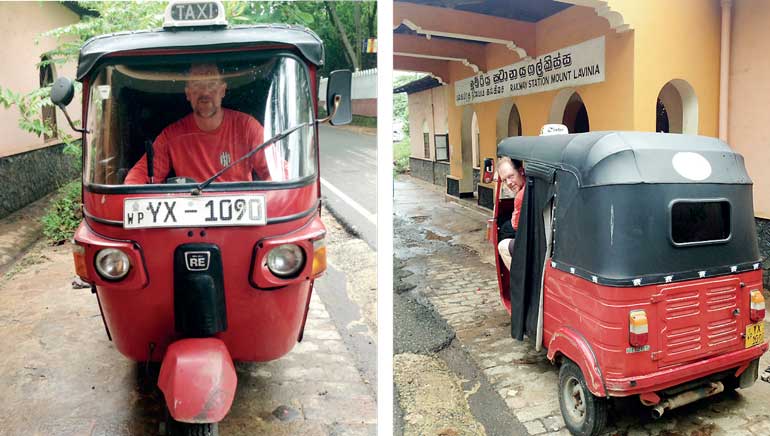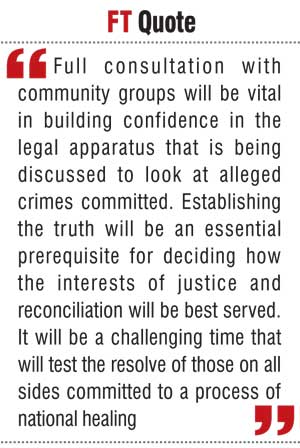Thursday Mar 05, 2026
Thursday Mar 05, 2026
Monday, 23 November 2015 00:00 - - {{hitsCtrl.values.hits}}

By Paul Godfrey
“Ah, so you must be the new X…” I guess this refrain must be familiar to almost anyone who changes job on a regular basis. One of the quirks of being a civil servant is that every three to four years, or as my friends in the private sector would put it, each time you actually know what you’re doing, you move jobs.
Normally, this is to a totally unrelated field where the only transferable skills are the broad gerundive expressed competencies in management speak (e.g. Leading and managing, working with people) you are expected to possess. In the diplomatic world, this often has the added bonus, or complication depending on your way of thinking, of being in a completely different country on which youre expected to be an expert in a matter of a few weeks.
Well, it has been a few weeks since my family (one wife, two school age children) and I landed at Bandaranaike International Airport. I certainly am no expert but I wanted to share a few, initial thoughts from a foreigners perspective on Sri Lanka and to give an insight into what the European Union is doing in the country and what we are trying to achieve.
People often ask me, But what do you actually do? Good question! The easy part is to say that a diplomats role is to represent the country s/he serves. We generally liaise with host governments, business people and what we generalise as ‘civil society’, which includes academics, unions, charities, lobbyists and faith groups to build relations and facilitate engagement between countries. Of course, it can seem trickier when you are representing 28 countries. The European Union developed from a desire to turn the economic and political competitiveness that had contributed to the World Wars into the foundation for peace and stability on the European continent.
The values that were central to the signatories of the Treaty of Rome in 1957 remain at the core of the EU nearly 60 years on, namely peace, democracy and human rights. Our mission is to advance those values on a global basis and as diplomats we are charged with working with our host governments to advance those values in the countries to which we are accredited.
Change of Government
Which brings me to Sri Lanka. From 1983 to 2009, a bloody civil war raged in the country resulting in an estimated 100,000 Sri Lankans losing their lives. The victory of the government forces over the Liberation Tigers of Tamil Eelam (LTTE) terrorist group brought an end to the war. But there were significant concerns about the state of democracy and human rights in the country. Many of these concerns contributed to Sri Lankans’ decision to vote out Mahinda Rajapaksa and elect Maithripala Sirisena, running on a good governance ticket, as President. That mandate was strengthened by a victory for the parties supporting change in August’s parliamentary election.
The change of Government has brought some remarkable changes in the relationship with the international community. Instead of continual sniping about interference and ‘neo-colonialism’, the new Government has restored Sri Lanka’s traditional support for international law. From the EU’s side, this has included inviting the EU to send an observer mission to the parliamentary elections, engaging more constructively with technical teams to meet the necessary conditions for Sri Lanka to restart fisheries’ exports to the EU and signalling an intention to make an application in due course for access to the Generalised System of Preferences Plus scheme (GSP+) a scheme that allows reduced tariff access to the European market in exchange for implementing international human rights and labour conventions.
These are important steps forward for the relationship between the EU and Sri Lanka. But perhaps the most high-profile has been the change in Sri Lanka’s engagement with the United Nations Human Rights Council. Cosponsoring the resolution marks an important step in acknowledging the need for action to enable and facilitate reconciliation between communities.
The resolution can be a starting point for a process to uncover the truth about what happened during the war. It is understandable that after the flawed inquiries held to date, many in the north and east are sceptical about the nature of this process, as I found out myself on a recent visit to Jaffna.
Many feel that the Tamil National Alliance, the main political grouping representing the Tamil community and the official Parliamentary opposition, have gone too far in endorsing a Sri Lankan-led process. The Government will have to convince doubters by taking identifiable steps to provide information on those missing and disappeared and by enabling the restoration of more normal life in the north through steps like the return of land taken by the military during the war and ensuring that people are able to go about their day to day lives without the sense of being watched.
Consulting with
community groups
Full consultation with community groups will be vital in building confidence in the legal apparatus that is being discussed to look at alleged crimes committed. Establishing the truth will be an essential prerequisite for deciding how the interests of justice and reconciliation will be best served. It will be a challenging time that will test the resolve of those on all sides committed to a process of national healing.
The European Union stands ready to do what it can to help the Sri Lankan Government and the Sri Lankan people. Yesterday, for the first time in six years, the EU’s Foreign Affairs Council, made up of the 28 Foreign Ministers from the EU’s member states and chaired by the High Representative Federica Mogherini - or ‘Boss’ to EU diplomats - discussed Sri Lanka. You can read the full text of their conclusions here.
The council welcomed the “significant advances” made by the Government since it took office and highlighted the new opportunities for the EU to engage with the Government of Sri Lanka in making further progress on reconciliation, strengthening good governance and tackling corruption, promoting respect for human rights and the rule of law, and fostering economic growth and sustainable development.” Sounds like I’m going to be busy in this amazing and exciting country. Till next time.
PS. Discovered jaggery – an unseparated molasses made from coconut sugar. Looks amazing, sounds amazing, tastes amazing.
The writer is the Deputy at the Delegation of the European Union to Sri Lanka and
the Maldives